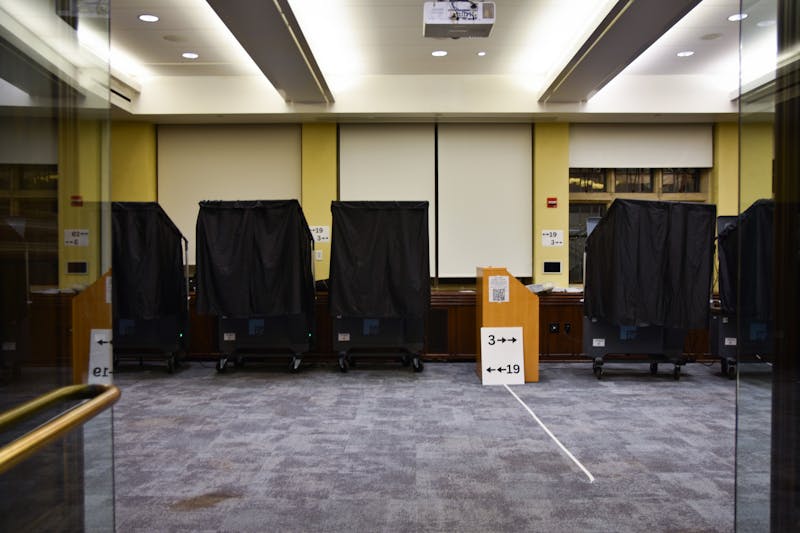
Penn healthcare experts and Philadelphia-area abortion providers talked about what the next four years might hold for reproductive healthcare.
Credit: Ethan Young1968 Wharton graduate Donald Trump was sworn in as the 47th president of the United States this week, ushering in a wave of uncertainty surrounding the future of reproductive rights and abortion access.
During Trump's first term in office — which saw the overturning of Roe v. Wade and significant changes to abortion policies at the state level — the landscape of reproductive healthcare shifted dramatically.
The Daily Pennsylvanian spoke with Penn health care experts and Philadelphia-area abortion providers about what the next four years might hold, from federal abortion bans to state-by-state restrictions.
Sarah Gutman is an obstetrician-gynecologist and abortion provider in Philadelphia with a subspecialty training in complex family planning.
“I’m definitely worried that a second Trump administration is going to severely limit people’s ability to access reproductive health care, in particular abortion and contraception care,” Gutman said. “The constant change in the political environment and the constant change in what restrictions are around is really confusing. It’s confusing for providers, and it’s confusing for patients.”
She said that the uncertainty can be a barrier for doctors who want to provide care but are concerned about the legal ramifications and for patients who may lose confidence in the medical system.
Perelman School of Medicine Assistant professor of Obstetrics and Gynecology Alice Abernathy, who researches the links between constrained abortion access and maternal mortality, told the DP that abortion bans have “always been unpopular across sectors of the population.”
During the 2024 election cycle, 10 states featured ballot measures that would enshrine abortion rights in their respective state constitutions. The measures passed in seven of those states, which Abernathy cited as evidence that voters wanted to preserve abortion access.
University of Pennsylvania Carey Law School professor Allison Hoffman — whose work examines health insurance regulation, the Affordable Care Act, and Medicare — explained that policies from the first Trump administration and previous Republican administrations signaled to her that the upcoming Trump administration will take similar actions regarding abortion access.
“There has been, in recent years, this pattern of flip flopping on certain areas and regulations as we move back and forth between Democratic and Republican administrations,” Hoffman added.
Hoffman highlighted the Title X Family Planning Program, a federal grant program that provides family planning and related preventative health services for low-income and uninsured individuals, as an example. Family planning clinics — which are typically well-funded by Democratic administrations — provide services such as pregnancy testing, infertility services, contraceptive counseling and provision, and cancer screenings.
The first Trump administration prohibited Title X family planning clinics from providing abortion referrals, Hoffman said, which caused a large number of family planning clinics to refuse federal funding rather than comply with the rule.
Planned Parenthood, for example, withdrew from Title X funding in 2019, despite previously receiving about $60 million annually through the program to serve more than 1.5 million low-income women, according to The New York Times.
The Biden administration reversed the regulations banning abortion referrals in 2021.
Hoffman said that she is fairly confident that the new Trump administration will reenact similar restrictions on Title X funding as part of the long-standing policy turn toward Republican administrations not wanting federal dollars to go toward abortion care.
She added that the ACA is another example where regulations vacillate between Democratic and Republican administrations.
The ACA requires that all health insurance plans include FDA-approved contraception coverage — with exemptions for religious organizations such as churches. Prior to Trump’s first administration, there were also exemptions in place for religious nonprofits and closely held for-profit corporations with religious objections.
During his first term, the Trump administration created a regulation that exempted all employers with religious or moral objections to this requirement from covering contraception in their plan, which Hoffman called a “really broad exemption.”
“It really gave employers full discretion to decide whether they were going to cover contraception or not,” Hoffman added.
Gutman also said that the “global gag rule” — which prevents foreign organizations that receive U.S. global health assistance from providing abortion services or referrals — is also high on her radar of policies that could be reinstated and expanded by the Trump administration.
Sarita Sonalkar, an associate professor of Obstetrics and Gynecology at Penn Med, agreed that Trump’s Supreme Court nominations during his past presidency — which “directly led to the decision to end the federal right to abortion” — were a likely indicator that he will continue to support policies that reduce access to safe reproductive services.
Sonalkar added that she believes this would lead to increased morbidity and mortality of vulnerable populations.
Abernathy noted that in recent public statements, Trump has vacillated on whether or not he would ban abortion federally, adding that “it seems Trump and his team are wrestling with what stance to take.”
During a campaign event in October, Trump said that he would veto a federal abortion ban, adding that he supports the rights of states to make decisions on abortion.
Even if Congress does not pass a federal law banning access to legal abortions, there are still other ways that the Trump administration could restrict abortions nationwide and that individual states can ban abortion care.
Gutman said that the Trump administration could refuse to enforce the Emergency Medical Treatment and Labor Act, which is a federal statute requiring hospitals to provide emergency care to patients who need it. The act protects patients who seek emergency care for acute pregnancy complications requiring an abortion to save the mother's life — even if it conflicts with the state's abortion ban.
Both Hoffman and Abernathy also discussed the possibility of Trump targeting two abortion pills. Medical abortions — which are induced by abortion pills — accounted for an estimated 63% of all abortions in 2023.
Hoffman and Gutman noted that the administration could try to limit medical abortion in a number of ways, including making it illegal to mail these pills under the Comstock Act.
The Comstock Act, which banned the mailing of anything intended for the “prevention of conception” and the “procuring of abortion,” was passed 150 years ago but has remained dormant for years. A second Trump administration could reinstate the Comstock Act.
In addition to addressing the availability of abortion pills by mail and at retail pharmacies, Abernathy said that she is uncertain about the extent to which FDA approval of these pills backslide under Trump’s presidency.
“There have been state efforts to reclassify these medications as more dangerous than they actually are, when they’re ultimately life-saving in many cases,” Abernathy added.
In the next four years, Gutman advised people to remain aware of misinformation and noted the increased stigma patients who need abortion or miscarriage care may face.
“There were really blatantly false things said by the Trump campaign and during the debates, and I think that also increases this risk of harm to providers,” Gutman said. “It’s going to be really important that you get your healthcare information from trusted sources.”
The Daily Pennsylvanian is an independent, student-run newspaper. Please consider making a donation to support the coverage that shapes the University. Your generosity ensures a future of strong journalism at Penn.
Donate











